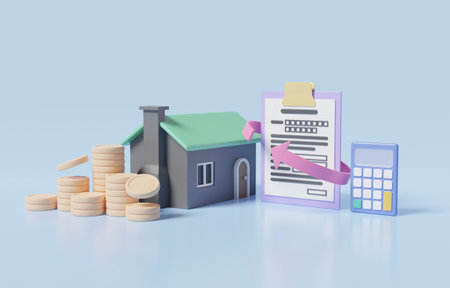What Are Closing Costs?
When youre buying a home, its easy to focus on the price of the house itself. But theres another important piece of the puzzle that can catch first-time buyers off guard—closing costs. These are the fees and expenses you need to pay when finalizing your mortgage and officially taking ownership of the property.
What Do Closing Costs Include?
Closing costs cover a variety of services and fees associated with the home-buying process. They can vary depending on your location, lender, and type of loan. Heres a breakdown of common closing cost items:
| Type of Fee | Description |
|---|---|
| Loan Origination Fee | Charged by the lender for processing your loan application. |
| Appraisal Fee | Pays for a professional appraisal to determine the homes market value. |
| Title Insurance | Protects against issues with ownership claims or title defects. |
| Home Inspection Fee | Covers the cost of having the home professionally inspected. |
| Escrow Fees | Fees paid to the escrow company managing the transaction process. |
| Recording Fees | Charged by local government to record the new deed and mortgage documents. |
| Prepaid Taxes & Insurance | Advance payments for property taxes and homeowners insurance. |
Who Pays Closing Costs?
Both buyers and sellers typically share in paying closing costs, but most of them fall on the buyers side. In some cases, you can negotiate with the seller to cover part of your closing costs—this is known as a seller concession. Your real estate agent can help you understand whats common in your area and how to approach this during negotiations.
Typical Responsibility Breakdown
| Party | Common Costs Covered |
|---|---|
| Buyer | Loan fees, appraisal, credit report, title insurance, escrow fees, recording fees, prepaid taxes and insurance |
| Seller | Agent commission (usually both agents), transfer taxes, prorated property taxes, any agreed-upon seller concessions |
When Are Closing Costs Due?
You’ll typically pay your closing costs at the closing meeting—the final step in buying your home. This is when all paperwork is signed, funds are transferred, and you receive the keys to your new place. Your lender will give you a Closing Disclosure at least three business days before closing, so you’ll know exactly what you owe ahead of time.
A Quick Tip:
You should budget about 2% to 5% of your homes purchase price for closing costs. So if youre buying a $300,000 home, expect to pay between $6,000 and $15,000 in closing fees.
Understanding these expenses upfront helps you avoid surprises and ensures youre financially prepared when its time to close on your new home.
2. Common Fees Included in Closing Costs
When buying a home, closing costs can feel overwhelming, especially if youre not sure what each fee is for. To help you better understand what youre paying for, heres a breakdown of the most common fees included in closing costs.
Loan Origination Fee
This fee is charged by your lender for processing your mortgage application. Its usually about 0.5% to 1% of your loan amount. It covers the lenders administrative costs and services related to setting up your loan.
Title Insurance
Title insurance protects both you and your lender from any legal issues or disputes over who owns the property. There are two types: lender’s title insurance (required) and owner’s title insurance (optional but recommended).
Appraisal Fee
An appraisal is required by most lenders to confirm that the homes value matches the purchase price. The fee typically ranges from $300 to $600 depending on the propertys size and location.
Escrow Fees
Escrow companies handle the money and documents involved in the real estate transaction. Their fees cover services like holding funds, managing paperwork, and coordinating with all parties during closing.
Other Common Fees
| Fee Type | Description | Estimated Cost |
|---|---|---|
| Credit Report Fee | Covers the cost of pulling your credit report for the lender to review. | $30 – $50 |
| Recording Fees | Charged by your local government to officially record the sale of the home. | $25 – $250 |
| Underwriting Fee | A charge from your lender for evaluating your loan application. | $400 – $600 |
| Survey Fee | If required, this pays for verifying property boundaries. | $300 – $500 |
| Pest Inspection Fee | Some states require a pest inspection before finalizing a home sale. | $75 – $150 |
| Homeowners Insurance Premium | You may need to prepay your first year of coverage at closing. | $500 – $1,200 annually |
| Property Taxes (Prorated) | You might have to pay a portion of upcoming property taxes at closing. | Varies by location and timing |
Why These Fees Matter
Each of these fees plays an important role in ensuring a smooth home purchase process. While they can add up quickly, understanding where your money is going can help you budget wisely and avoid surprises at the closing table.
![]()
3. How Much Should You Expect to Pay?
When youre buying a home, closing costs are an important part of the total expense. On average, homebuyers in the U.S. can expect to pay between 2% to 5% of the homes purchase price in closing costs. This means if youre buying a $300,000 home, your closing costs could range from $6,000 to $15,000.
Typical Closing Costs Breakdown
The actual amount you’ll pay depends on several factors including location, lender fees, and the type of loan you choose. Heres a basic breakdown of common closing cost items:
| Cost Item | Estimated Amount or Range |
|---|---|
| Loan Origination Fee | 0.5% – 1% of loan amount |
| Appraisal Fee | $300 – $600 |
| Title Insurance | $500 – $1,500 (varies by state) |
| Home Inspection Fee | $300 – $500 |
| Escrow Fees | $500 – $2,000 |
| Attorney Fees (if applicable) | $500 – $1,500 |
| Recording Fees & Transfer Taxes | $100 – $1,000+ |
| Prepaid Property Taxes & Insurance | Varies based on local tax rates and policy premiums |
Factors That Influence Closing Costs
Location: Closing costs vary by state and even by county. For example, New York and California typically have higher fees than states like Indiana or Missouri.
Lender Requirements: Different lenders charge different fees for processing your mortgage application. Its always a good idea to compare quotes from multiple lenders.
Type of Loan: FHA, VA, and conventional loans may have different fee structures. Some government-backed loans limit certain fees that can be charged to buyers.
Negotiations: In some cases, buyers can negotiate with the seller to cover part of the closing costs, especially in a buyers market.
Down Payment Size: A larger down payment may reduce some lender-related fees or eliminate the need for private mortgage insurance (PMI), which can affect your upfront costs.
Quick Example Based on Home Price:
| Home Price | Estimated Closing Costs (2% – 5%) |
|---|---|
| $250,000 | $5,000 – $12,500 |
| $350,000 | $7,000 – $17,500 |
| $450,000 | $9,000 – $22,500 |
| $550,000 | $11,000 – $27,500 |
4. Who Pays for What?
When it comes to closing costs, one of the most common questions homebuyers have is: “Who pays for what?” The answer can vary depending on the location, the specifics of the deal, and how negotiations go between the buyer and seller. However, there are some general guidelines that can help you understand what to expect.
Typical Buyer-Paid Closing Costs
Buyers usually cover most of the fees associated with getting a mortgage and finalizing the purchase of the home. These may include:
- Loan origination fees: Charged by the lender for processing your loan application.
- Appraisal fee: Covers the cost of having the property appraised to determine its value.
- Credit report fee: A small charge for pulling your credit history.
- Title insurance (lender’s policy): Protects the lender in case theres an issue with the property title.
- Home inspection: Although optional, its highly recommended and typically paid by the buyer.
- Escrow fees (partial): Shared between buyer and seller in many states.
- Prepaid taxes and insurance: Property taxes and homeowners insurance may need to be paid upfront at closing.
Typical Seller-Paid Closing Costs
Sellers generally pay costs related to transferring ownership and paying off their own obligations. These can include:
- Real estate agent commissions: Usually about 5%–6% of the sale price, split between buyers and sellers agents.
- Title insurance (owner’s policy): Covers issues with ownership claims and is often paid by the seller in many states.
- Transfer taxes: Fees charged by state or local governments when property changes hands.
- Outstanding liens or mortgages: Any debts tied to the property must be paid off before transfer.
- Escrow fees (partial): In many cases, escrow service costs are shared equally with the buyer.
A Quick Comparison
| Closing Cost Item | Typically Paid By |
|---|---|
| Loan Origination Fee | Buyer |
| Appraisal Fee | Buyer |
| Credit Report Fee | Buyer |
| Lender’s Title Insurance | Buyer |
| Owner’s Title Insurance | Seller (in most states) |
| Real Estate Agent Commission | Seller |
| Transfer Taxes | Seller (varies by state) |
| Escrow Fees | Split between Buyer & Seller |
| Home Inspection | Buyer |
| Prepaid Property Taxes & Insurance | Buyer |
The Role of Negotiation
The good news is that many closing costs are negotiable. Depending on market conditions, a motivated seller might agree to cover part—or even all—of the buyers closing costs. This is especially common in a buyer’s market or if repairs are needed after inspection. On the flip side, in a competitive market, buyers may offer to cover more closing costs themselves to make their offer more attractive. Always talk to your real estate agent about what makes sense in your situation before negotiating who pays for what.
A Tip for First-Time Buyers:
If youre short on cash at closing, ask your lender if they allow seller concessions—this means the seller agrees to pay some of your closing costs as part of your mortgage agreement. There are limits based on loan type, but it could help reduce upfront expenses.
The Bottom Line on Who Pays What:
No two deals are exactly alike, so while there are norms, everything is up for discussion. Understanding which party typically covers which expenses will help you navigate negotiations and budget accordingly during your homebuying journey.
5. Tips to Reduce Your Closing Costs
Closing costs can add up quickly, but the good news is there are smart ways to keep them in check. Here are some practical tips homebuyers can use to reduce these expenses and potentially save hundreds—or even thousands—of dollars.
Compare Loan Estimates from Multiple Lenders
One of the best ways to save money on closing costs is by shopping around for your mortgage. Different lenders may offer different rates and fees, so it’s important to get at least three Loan Estimates before making a decision. Look closely at the “Loan Costs” and “Other Costs” sections of each estimate.
| Lender | Origination Fee | Appraisal Fee | Total Estimated Closing Costs |
|---|---|---|---|
| Lender A | $1,200 | $500 | $6,500 |
| Lender B | $750 | $450 | $5,900 |
| Lender C | $1,000 | $550 | $6,300 |
This simple comparison shows how costs can vary—and how choosing the right lender can lead to savings.
Negotiate Fees with Your Lender or Real Estate Agent
Not all closing fees are set in stone. Some third-party charges, like title insurance or settlement services, can sometimes be negotiated or shopped for independently. Ask your lender which services you’re allowed to shop for and get quotes from different providers.
Common Negotiable Fees:
- Title Insurance
- Home Inspection Fees
- Survey Fees
- Attorney Fees (in states where required)
- Escrow Services
Your real estate agent may also agree to help cover part of your closing costs as part of the negotiation process—especially in a buyer’s market.
Ask About Lender Credits
Lender credits can help reduce your upfront costs. In exchange for accepting a slightly higher interest rate, the lender gives you money to put toward your closing costs. This option can be helpful if youre short on cash now but plan to stay in the home long enough that the slightly higher monthly payment balances out.
Example:
| Option | Interest Rate | Lender Credit Offered |
|---|---|---|
| No Credit | 6.25% | $0 |
| With Credit | 6.50% | $2,000 toward closing costs |
This strategy isn’t right for everyone, but it can be a valuable tool depending on your financial goals and how long you plan to stay in the home.
Avoid Unnecessary Add-Ons or Extras
Review your Loan Estimate carefully and question any unfamiliar fees. Sometimes lenders include optional add-ons like mortgage protection insurance or rate lock extension fees that you might not need. Don’t hesitate to ask what each charge is for and whether it’s required.
Time Your Closing Wisely
If you close near the end of the month, you’ll pay less prepaid interest at closing because interest accrues daily from the closing date through the end of the month. This won’t change your total loan cost, but it could lower your upfront cash requirement.
By taking these steps—comparing lenders, negotiating fees, exploring credits, trimming extras, and timing your closing—you’ll put yourself in a stronger position to manage and reduce your overall closing costs.


